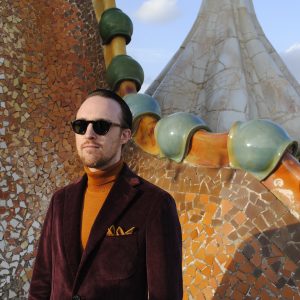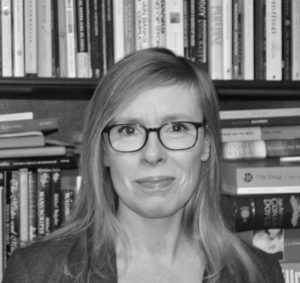
Per Faxneld obtained his PhD (2014) in History of Religions at Stockholm University, with his thesis Satanic Feminism: Lucifer as the Liberator of Woman in Nineteenth-Century Culture, (subsequently re-published by Oxford University Press in 2017). He has published extensively on esotericism – in academic journals like Numen, Nova Religio, and Temenos – as well as in books issued by for example Yale University Press, Palgrave Macmillan, Routledge, Equinox, Ashgate, Acumen, and Brill. Moreover, he has contributed to exhibition catalogues from the Edvard Munch Museum in Oslo and the Akseli Gallen-Kallela Museum in Finland, and has given public lectures at several museums in Sweden, Norway, Finland, Poland, and Mexico. One of his main research interests is the relationship between literature, visual art, and esotericism. Faxneld is a senior lecturer/associate professor at Södertörn University, Stockholm.
Keynote lecture: The Death of the Author and the Birth of the Luciferian Reader: Ur-images, Postmodernity and Semiotic Self-Apotheosis
The presentation will analyse the function of esoteric symbolism, specifically the imagery in a series of Luciferian engravings, in Arturo Pérez-Reverte’s novel El Club Dumas (1993), and the film that was based on it, The Ninth Gate (Roman Polanski, 1999). My argument is that the fragmentation of these images in the novel, where it becomes impossible to reach the “ur-images”, is a commentary on the postmodern condition and a perceived shattering of grand narratives and objective divine (or diabolic) truths. Signs and symbols become unstable and polyphonic floating signifiers. This renders the esoteric enlightenment, the single “true” meaning of the symbols, impossible to reach. The protagonist is helped by Lucifer to accept this, and to realize that it sets him free: the absence of a limiting pre-scripted esoteric metanarrative enables him to create his own narrative as he embraces the liberty the postmodern condition brings. The metaphoric death of the “author”, and the dissipation of his one true narrative, frees the “reader” of esoteric signs and symbols and lets him be reborn as a “creator god”. Polanski’s film, on the other hand, retains the benevolent Lucifer, but here the figure instead acts as an initiator into a more classic esoteric enlightenment, where the series of engravings is ultimately restored to its complete, pristine condition and its riddle solved, dispelling the threat of postmodern dissolution of the symbolic. The Ninth Gate thus negates Pérez-Reverte’s reconfiguration of esoteric Luciferian enlightenment. In the film, as the presentation will demonstrate, esoteric symbols are reintegrated into a metanarrative once more, thus to some degree making Polanski’s version of the tale an anti-postmodern work.

Christine Ferguson is Professor in English Literature at the University of Stirling, where her research focuses on the entwined histories of the literary gothic and modern occultism. She recently led the AHRC research network Popular Occulture in Britain, 1875-1947, and co-edited (with Andrew Radford) the essay collection The Occult Imagination in Britain (Routledge 2018). Her new book project focuses on the popular fiction networks and periodical culture of the Victorian occult revival.
Keynote lecture: Journoccultism: Newspaper Scrying from Machen to Fort
Modern Western esotericism often appears to be a deeply bibliolatric enterprise. From the writings of Lévi to Blavatsky, its literary canon heaves with reference to ancient, mysterious, and exclusive tomes whose teachings and circulation have been necessarily restricted until the contemporary moment of revelation, and which even now remain difficult to access. Yet as modern occultists have apotheosized the (typically ancient, and usually singular) book, so too have many made their living as men and women of the press, writing for ephemeral, accessible, and mass-produced newspapers that aimed for as wide an audience as possible. The significance of such journalistic pursuits, not simply for the dissemination, but also for the textual poetics and visionary techniques of the occult revival remains unreckoned. Building on the recent IAPSOP-fuelled periodical turn in esotericism studies, my paper examines how the newspaper itself came to be theorized as a magical print interface in the early twentieth-century transatlantic cultic milieu, its value as a prompt to esoteric consciousness coming ultimately to rival that of the printed book or rare manuscript. Focusing on the writing of Arthur Machen and Charles Fort, I demonstrate how these “newspaper scryers” aligned the reportage techniques and reading habits required by popular journalism with the esoteric and anomalistic worldviews they respectively pursued, anticipating in the process the later occultural “cut-up” techniques of Brion Gysin and Genesis P-Orridge.

Olav Hammer is professor at the Department of History, Study of Religions at The University of Southern Denmark. His main fields of interest are contemporary religious movements (NRM’s, New Age religion), theory and method in the study of religion, religion and power, Western Esotericism. His latest project is about “Modern Myths about the Ancient Past”.
Keynote lecture: Esotericism and mysticism: two essentially contested concepts
Esotericism and mysticism are two notoriously elusive concepts. Both are based on referential corpora of works that are so internally diverse as to defy any simple characterization. A definition of mysticism needs to encompass a range of empirical cases that include Medieval Christian visionaries, Sufis, and Hindu gurus such as Ramakrishna. Similarly, the term esotericism denotes the work of individuals as diverse as Paracelsus, Swedenborg, and Carl Gustav Jung. Unsurprisingly, mysticism has in a recent encyclopedia (Brills Vocabulary for the Study of Religion) been characterized as a taxonomical black hole, while esotericism has been described by a leading scholar on that topic, Wouter J. Hanegraaff, as a waste-basket category for a range of currents that have little else in common than having been rejected by mainstream theologians and by post-Enlightenment rationalists. Nevertheless, both terms continue to be used in ways that presuppose a shared understanding of what they signify, a situation that raises fundamental questions: How do the referential corpora relate to the main attempts to define the terms mysticism and esotericism? How do these two categories relate to each other?

Maarit Leskelä-Kärki (PhD, Adjunct Professor) is University Lecturer at the Department of Cultural History at the University of Turku. She is also the co-director of the research center SELMA which explores the interrelations between storytelling, experientiality and memory. Leskelä-Kärki’s main research interests cover cultural history of women’s writing, autobiographical sources and life-narratives as well as biographical research and feminist studies. She is the leader of the research project Seekers of the New: Esotericism and the transformation of religiosity in the modernising Finland (2018–2020). Topics: gender, ethics, writing.
Keynote lecture: Ethics and Esotericism
As the research concerning esotericism has extended during the past two decades into a very diverse field of study from the study of religions into the fields of history, art, literature, music and popular culture studies, the approaches and theoretical perspectives have multiplied as well. Also the popular literature has been active in presenting esoteric ideas, movements and individuals, but often in a way that has labeled people related to esotericism not only as eccentric, but often also immoral, pathological, and marginal ones. Not enough attention has been paid to the topic of ethics in studying the history of esotericism. In this paper, I will approach this research field from the perspective of studying historical individuals and the ethical challenges related to that. Ethics refers here both to the position of the researcher and to the ways we treat past individuals and make interpretations. What are the ethical challenges of studying individuals and their intimate sources in the context of esotericism? On what grounds can we label individuals as esoteric or not? And how is this related to our position as scholars? I will argue that we need to be much more sensitive to the differences in the past when doing interpretations concerning individuals, and we have to be ethically aware of our position as interpreters. This means careful working with historical source materials, but also sensitivity to both the long traditions of esotericism and to the context of particular historical moments.
